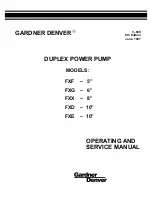
CONNECT SERIES SERVICE MANUAL
43
ENGLISH
Maintenance
5. Detach the compressor
• Check the condition of the damaged compressor, including its position and model.
• If the information of the compressor is confirmed, check the oil quality.
• I. If the oil is clear and impurities-free, we consider that the oil of the system is not polluted. Meanwhile,
if we confirm that the valves and pipes are also normal, then we can replace the compressor only. For
the removal of compressor, please refer to the section: Removal of Major Components.
• How to check oil quality:
• A. After the compressor is detached, put it on a solid surface and shake it at an angle of 30~45°
to ensure that the contaminant at the bottom of the compressor can be poured out.
• B. Place the compressor at a position above the ground level and then pour out the oil from
the suction inlet of the compressor. Collect the oil in a transparent container. The amount of oil
should be over 150ml.
• Notes:
• The axial direction of the compressor should not slant at an angle larger than 20° to the
horizontal plane.
• Prevent the compressor from falling.
• Put a transparent container (over 150ml in volume) under the suction port to collect the
compressor oil, thus we can see the oil quality.
• C. Put the container of compressor lubricant in a bright location and see if there is impurity and
discoloration. Sniff at the compressor lubricant. Normally, there is no pungent smell.
• II. If the oil is contaminated, replace the compressor and the gas-liquid separator.
• Note: Confirm whether the compressor needs to be replaced. The refrigerant ports of the faulted
compressor must be sealed by adhesive tape as soon as the compressor is detached. Make sure
the compressor is well preserved for future analysis.
6. Check the components
• If the oil is contaminated, check the components of the unit, including the gas-liquid separator.
• Check the gas-liquid separator.
• When the separator is detached, check
whether there are impurities inside. Testing
method is listed below.
• Note: When pouring the liquid from the
separator, make sure the discharge pipe is
at the lower position. Slant at an angle not
greater than 20°
• Use a transparent container to collect
the content inside the separator. Check
its color, seal it well and return it to the
factory for inspection.
• Note: If the compressor is damaged and
needs to be replaced, the gas-liquid
separator should also be replaced, whether
or not there are impurities in the separator
or other abnormal conditions.
• Confirm which parts of the system should
be replaced. Make sure the refrigerant
ports of the damaged parts or components
are sealed by adhesive tape as soon as
they are detached. Keep them in the
original condition for future analysis.
2. Remove the screw bolt of
the separator.
1. Remove the screw bolt of
the separator.
3. Remove the separator.
Summary of Contents for GE APPLIANCES AUH2436ZGDA
Page 13: ...CONNECT SERIES SERVICE MANUAL 11 ENGLISH Troubleshooting Model AUH4860ZGDA ...
Page 22: ...CONNECT SERIES SERVICE MANUAL 20 ENGLISH Troubleshooting AUH4860ZGDAA ...
Page 84: ...CONNECT SERIES SERVICE MANUAL 82 ENGLISH Maintenance AUH4860ZGDA ...
Page 96: ...CONNECT SERIES SERVICE MANUAL ENGLISH Appendices 94 ...
Page 97: ...CONNECT SERIES SERVICE MANUAL 95 ENGLISH Appendices ...
Page 98: ...CONNECT SERIES SERVICE MANUAL 96 ENGLISH Appendices ...
Page 99: ...CONNECT SERIES SERVICE MANUAL 97 ENGLISH Appendices ...
Page 101: ......
















































